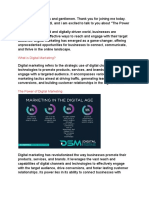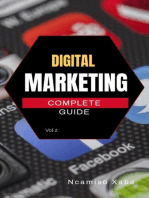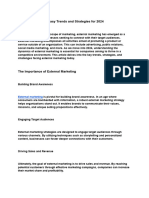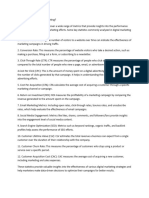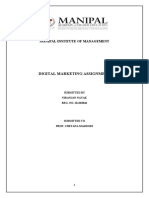The Ultimate Playbook for Digital Marketing in 2024
The Ultimate Playbook for Digital Marketing in 2024
Uploaded by
O RRCopyright:
Available Formats
The Ultimate Playbook for Digital Marketing in 2024
The Ultimate Playbook for Digital Marketing in 2024
Uploaded by
O RRCopyright
Available Formats
Share this document
Did you find this document useful?
Is this content inappropriate?
Copyright:
Available Formats
The Ultimate Playbook for Digital Marketing in 2024
The Ultimate Playbook for Digital Marketing in 2024
Uploaded by
O RRCopyright:
Available Formats
The Ultimate Playbook:
Digital Marketing in 2024
In today's fast-paced and ever-evolving digital landscape, businesses face unprecedented
challenges and opportunities in reaching and engaging their target audience.
To thrive in this dynamic environment, it’s essential for businesses to embrace a comprehensive
digital marketing strategy that leverages a diverse array of tactics and channels.
This eBook serves as your guide to navigating digital marketing in 2024, covering essential
topics such as Pay-Per-Click advertising, Content Marketing, Search Engine Optimization (SEO),
Email Newsletters, and Website Design.
Each of these services plays a critical role in driving business success by enhancing visibility,
increasing brand awareness, driving traffic, and ultimately, converting leads into loyal customers.
Power of Pay-Per-Click Marketing
In the ever-evolving landscape of digital marketing, Pay-Per-Click (PPC) advertising continues
to reign supreme as one of the most effective and dynamic strategies for businesses to reach
their target audience.
In this section, we'll delve into three key components of PPC marketing: Google Pay-Per-Click,
Facebook Ads, and Geo-Fencing, exploring their significance and impact on achieving marketing
success in 2024.
Google PPC
Google Pay-Per-Click, commonly known as Google Ads, is a paid advertising platform that
enables businesses to display their ads on Google's search engine results pages (SERPs) and
across its vast network of partner sites.
This form of advertising operates on a pay-per-click model, meaning advertisers only pay when
users click on their ads.
© Samson Media LLC | Samsonmedia.net| Page-1
Why it's Important:
1. Unparalleled Reach: With over 90% of the global search engine market share, Google is the
go-to platform for users seeking information, products, and services. By leveraging Google
Ads, businesses can tap into this massive pool of potential customers and ensure their brand
remains visible to relevant audiences.
2. Targeted Advertising: Google Ads offers sophisticated targeting options, allowing
advertisers to reach specific demographics, locations, interests, and even remarket to users
who have previously interacted with their website. This precision targeting ensures that ad
spend is allocated towards reaching the most qualified leads, maximizing the return on
investment (ROI).
3. Real-Time Performance Tracking: Google Ads provides robust analytics and tracking
capabilities, enabling advertisers to monitor the performance of their campaigns in real-time.
By analyzing metrics such as click-through rates, conversion rates, and cost-per-acquisition,
businesses can make data-driven decisions to optimize their campaigns for better results.
Facebook Ads
Facebook Ads allow businesses to target users based on demographics, interests, behavior, and
connections. With over 2.8 billion monthly active users, Facebook offers unparalleled access to a
diverse audience across various demographics and interests.
Why it's Important:
1. Audience Targeting: Facebook's extensive user data allows advertisers to precisely target
their ads to specific audience segments, ensuring that messages resonate with the right
people at the right time. This targeted approach increases the likelihood of engagement and
conversion, driving measurable results for businesses.
2. Visual Appeal: Facebook Ads support various ad formats, including images, videos,
carousels, and slideshows, allowing businesses to create visually engaging and compelling
ads that capture the attention of users as they scroll through their feeds. By leveraging rich
media content, advertisers can convey their brand message effectively and leave a lasting
impression on their audience.
3. Social Proof and Engagement: Facebook's social nature encourages interaction and
engagement with ads through likes, comments, and shares. This social proof not only
enhances brand credibility but also extends the reach of ads virally as users interact with and
share content with their networks.
Geo-Fencing
Geo-fencing is a location-based advertising strategy that enables businesses to target users
within a specific geographic area. By defining virtual boundaries or "fences" around physical
locations, such as stores, events, or competitor locations, businesses can deliver targeted ads to
users' mobile devices when they enter or exit the designated area.
© Samson Media LLC | Samsonmedia.net| Page-2
Why it's Important:
1. Hyper-Local Targeting: Geo-fencing allows businesses to target users with pinpoint
accuracy based on their physical location. This hyper-local targeting ensures that ads are
delivered to users who are most likely to be interested in the products or services offered,
increasing the relevance and effectiveness of the advertising message.
2. Enhanced Relevance and Personalization: By delivering ads based on users' real-time
location, businesses can create highly relevant and personalized experiences that resonate
with users' immediate needs and interests. Whether promoting in-store offers, driving foot
traffic to a location, or capitalizing on local events, geo-fencing enables businesses to tailor
their messaging to the local context, driving higher engagement and conversions.
3. Competitive Advantage: Geo-fencing allows businesses to gain a competitive edge by
targeting users who are near their competitors' locations. By delivering timely and relevant
ads to users when they are near competitor establishments, businesses can influence
purchase decisions and attract customers away from competitors, ultimately driving sales
and market share.
Pay-Per-Click advertising, encompassing Google Ads, Facebook Ads, and Geo-Fencing, remains
a cornerstone of digital marketing strategies in 2024.
By harnessing the power of these platforms and tactics, businesses can expand their reach,
target the right audience with precision, and drive measurable results that contribute to their
overall marketing success in the digital age.
Mastering Content Marketing in 2024
Content marketing is the art of creating and distributing valuable, relevant, and consistent
content to attract and retain a clearly defined audience, ultimately driving profitable customer
action.
In today's digital landscape, where consumers are inundated with information, content
marketing serves as a beacon of authenticity and value, allowing businesses to connect with
their audience on a deeper level.
Why it's Important:
1. Building Brand Authority: By consistently delivering high-quality content that addresses
the needs and pain points of your target audience, businesses can establish themselves as
trusted authorities in their industry. This builds credibility and fosters trust, making it more
likely for consumers to choose your brand over competitors.
2. Driving Organic Traffic: Content marketing is a cornerstone of organic search engine
optimization (SEO), as search engines prioritize valuable and relevant content when ranking
websites. By optimizing content for relevant keywords and providing valuable information,
© Samson Media LLC | Samsonmedia.net| Page-3
businesses can improve their visibility in search engine results pages (SERPs) and attract
organic traffic to their website.
3. Nurturing Customer Relationships: Content marketing allows businesses to engage with
their audience at every stage of the customer journey, from awareness to advocacy. By
delivering personalized and relevant content tailored to the needs and interests of different
segments of your audience, businesses can nurture relationships and guide prospects
through the sales funnel, ultimately driving conversions and fostering customer loyalty.
Dominating Search Engine Optimization in 2024
Search Engine Optimization (SEO) is the process of optimizing your website and content to
improve its visibility and ranking in search engine results pages (SERPs).
In an increasingly competitive online landscape, where millions of websites vie for attention, SEO
is essential for ensuring that your website stands out and attracts organic traffic from search
engines like Google.
Why it's Important:
1. Enhanced Visibility: Most online experiences begin with a search engine, making visibility in
search results crucial for attracting organic traffic to your website. By optimizing your
website and content for relevant keywords and search queries, businesses can improve their
visibility in search engine results pages (SERPs) and increase their chances of being
discovered by potential customers.
2. Targeted Traffic: SEO enables businesses to target users who are actively searching for
products or services related to their industry, making it a highly effective lead generation
strategy. By optimizing content for relevant keywords and providing valuable information
that addresses the needs and pain points of your target audience, businesses can attract
qualified leads who are more likely to convert into customers.
3. Long-Term Sustainability: Unlike paid advertising, which ceases to generate traffic once the
ad budget is depleted, SEO provides long-term sustainability and continuous traffic
generation. By investing in SEO, businesses can build a solid foundation for their online
presence and reap the benefits of increased visibility and organic traffic over time, without
ongoing advertising costs.
Harnessing the Power of Email Newsletters in
2024
Email newsletters are a powerful tool for building and nurturing relationships with your
audience through regular communication and engagement. Newsletters enable businesses to
connect with their audience, provide valuable information, and drive engagement and
conversions.
© Samson Media LLC | Samsonmedia.net| Page-4
Why it's Important:
1. Direct Communication Channel: Email newsletters provide a direct line of communication
between businesses and their audience, allowing them to deliver personalized messages,
updates, and promotions directly to subscribers' inboxes. This direct communication channel
enables businesses to stay top-of-mind with their audience and drive engagement and
conversions.
2. Building Trust and Credibility: By consistently delivering valuable content that educates,
entertains, or solves problems for subscribers, businesses can build trust and credibility with
their audience. This trust lays the foundation for strong customer relationships and increases
the likelihood of subscribers engaging with future communications and making purchases.
3. Driving Traffic and Conversions: Email newsletters are an effective way to drive traffic to
your website, blog, or other digital assets, increasing visibility and engagement with your
brand. By including links to relevant content, promotions, or calls-to-action (CTAs) in your
newsletters, businesses can encourage subscribers to take desired actions, such as visiting
your website, making a purchase, or signing up for an event or webinar.
Crafting Compelling Websites in 2024
Website design plays a crucial role in shaping the online presence and user experience of a
business.
In an era where consumers increasingly turn to the internet to research products and services, a
well-designed website is essential for capturing attention, building trust, and driving
conversions.
Why it's Important:
1. First Impressions Matter: Your website is often the first point of contact between your
business and potential customers. A visually appealing and well-designed website creates a
positive first impression, instilling confidence in visitors and encouraging them to explore
further.
2. User Experience (UX): A website's design directly impacts the user experience, influencing
factors such as navigation, accessibility, and functionality. By prioritizing usability and
intuitive design, businesses can ensure that visitors can easily find the information they're
looking for and complete desired actions, such as making a purchase or filling out a contact
form.
3. Mobile Responsiveness: With most internet traffic now coming from mobile devices, it's
essential for websites to be mobile-responsive, meaning they adapt seamlessly to different
screen sizes and devices. A mobile-responsive website not only improves the user
experience for mobile users but also enhances search engine visibility, as search engines
prioritize mobile-friendly websites in their rankings.
© Samson Media LLC | Samsonmedia.net| Page-5
Digital Dominance in 2024
We've explored the dynamic landscape of digital marke琀椀ng and uncovered the essen琀椀al strategies and
tac琀椀cs that businesses need to thrive in the digital age.
By embracing a holis琀椀c approach that encompasses Pay-Per-Click adver琀椀sing, Content Marke琀椀ng, Search
Engine Op琀椀miza琀椀on (SEO), Email newsle琀琀ers, and Website Design, businesses can create a powerful
digital marke琀椀ng strategy that maximizes their online presence, engages their target audience, and
drives meaningful results.
Whether you're a seasoned marketer looking to stay ahead of the curve or a business owner seeking to
elevate your digital presence, "Digital Dominance" equips you with the knowledge and tools you need to
achieve marke琀椀ng success in 2024 and beyond.
About Samson Media, LLC
Welcome to Samson Media, your trusted partner in website design and internet
marke琀椀ng solu琀椀ons. Since 2006, we have been serving small and medium-sized
businesses, driven by a commitment to help businesses like yours succeed online.
Whether your goal is to increase sales, generate leads, or boost brand awareness,
our websites and internet marke琀椀ng plans are tailored to help you achieve your
objec琀椀ves.
At Samson Media, we o昀昀er a comprehensive suite of services, including Pay-Per-
Click adver琀椀sing, Content Marke琀椀ng, Search Engine Op琀椀miza琀椀on (SEO), Email
newsle琀琀ers, and Website Design, all me琀椀culously cra昀琀ed to elevate your online
presence and drive tangible results for your business. Let Samson Media be your
guide to online success.
Contact us today to discover how we can help grow your business through
strategic website design and internet marke琀椀ng solu琀椀ons.
Phone: 973.433.9518 | Email: produc琀椀on@samsonmedia.net | Web: h琀琀ps://samsonmedia.net/
© Samson Media LLC | Samsonmedia.net| Page-6
You might also like
- Lulz SecDocument12 pagesLulz SecStephan LewisNo ratings yet
- What Is Digital Marketing?Document11 pagesWhat Is Digital Marketing?Aziz JedidiNo ratings yet
- Digital Marketing Refers To The Practice of Promoting ProductsDocument11 pagesDigital Marketing Refers To The Practice of Promoting ProductsLyness PhiriNo ratings yet
- Fidhadigital in Importance of Digital Marketing in BusinessDocument1 pageFidhadigital in Importance of Digital Marketing in Businessfidhaashraf525No ratings yet
- Fidhadigital in Importance of Digital Marketing in BusinessDocument1 pageFidhadigital in Importance of Digital Marketing in Businessfidhaashraf525No ratings yet
- BS CSDocument6 pagesBS CSIQFA mughalNo ratings yet
- Digital MarketingDocument11 pagesDigital Marketingcbaitdm150ramisNo ratings yet
- Marketing AssignmentDocument11 pagesMarketing Assignmentragini dadwalNo ratings yet
- Digital Advertising1691765515503Document6 pagesDigital Advertising1691765515503xdamandhimanNo ratings yet
- Digital Marketing001Document26 pagesDigital Marketing001jerrom.c.prashanthNo ratings yet
- E CommerceDocument27 pagesE Commercebharath1172004No ratings yet
- DM Assignment AnswerDocument16 pagesDM Assignment AnswerLucky RajputNo ratings yet
- Introduction To Search Engine MarketingDocument6 pagesIntroduction To Search Engine Marketingkeerthipeyyala17No ratings yet
- Tech Trends - CH 7Document14 pagesTech Trends - CH 7Joshua NyabindaNo ratings yet
- SYNOPSIS MBAMM EN 2352748570Document22 pagesSYNOPSIS MBAMM EN 2352748570bappadascomputerNo ratings yet
- Digital MarketingDocument19 pagesDigital MarketingKUNJUNo ratings yet
- E-Commerce Advertising Platforms: Driving Success in Online RetailDocument6 pagesE-Commerce Advertising Platforms: Driving Success in Online Retailsamjoshef37No ratings yet
- Digital MarketingDocument9 pagesDigital Marketingmirza asadNo ratings yet
- Unit - I: Part - BDocument5 pagesUnit - I: Part - Bprithiviraj.annaduraiNo ratings yet
- What Is Digital MarketingDocument3 pagesWhat Is Digital MarketingParul GuptaNo ratings yet
- What Is Digital Marketing?Document5 pagesWhat Is Digital Marketing?Dinesh KumarNo ratings yet
- How To Earn Money: Digital MarketingDocument10 pagesHow To Earn Money: Digital MarketingnutcrackerNo ratings yet
- Importance of Digital Marketing - 02042020Document13 pagesImportance of Digital Marketing - 02042020Cust DigiNo ratings yet
- Digital MarketingDocument3 pagesDigital MarketingpainterpaintssssNo ratings yet
- Khaled Shehata Imc FinalDocument13 pagesKhaled Shehata Imc FinalKhaled ShehataNo ratings yet
- Digital MarketingDocument2 pagesDigital Marketinggoyalparul571No ratings yet
- Digital MarketingDocument5 pagesDigital MarketingarsipregaNo ratings yet
- DXYDZFGYRTDCDocument6 pagesDXYDZFGYRTDCshakilms043No ratings yet
- DIGITAL MARKETINGDocument11 pagesDIGITAL MARKETINGVijaya Lakshmi GantaReddyNo ratings yet
- Bba DM Unit 2Document42 pagesBba DM Unit 2prayanshchaturvedibusinessNo ratings yet
- Dissertation ContentDocument9 pagesDissertation ContentSurendra SorenNo ratings yet
- Introduction-to-Online-Marketing (1)Document10 pagesIntroduction-to-Online-Marketing (1)Michael AugustinNo ratings yet
- Digtial MarketingDocument6 pagesDigtial Marketingnikitabuva17No ratings yet
- Digital MarketingDocument38 pagesDigital MarketingChandrima MannaNo ratings yet
- Digital Marketing Notes-1Document17 pagesDigital Marketing Notes-1kevanaccNo ratings yet
- A Study On Implementing Digital Marketing Strategies For wallyAX To Grow The BrandDocument53 pagesA Study On Implementing Digital Marketing Strategies For wallyAX To Grow The Brand42 SUBASH KNo ratings yet
- Digital Marketing Assignment: Manipal Institute of ManagementDocument21 pagesDigital Marketing Assignment: Manipal Institute of ManagementMuktha NayakNo ratings yet
- DigiMark HandOuts 1..Document5 pagesDigiMark HandOuts 1..Romeo De Guzman Jr.No ratings yet
- DigiMark HandOuts 1Document5 pagesDigiMark HandOuts 1Romeo De Guzman Jr.No ratings yet
- Digital Marketing Bcom Sem 1Document114 pagesDigital Marketing Bcom Sem 1Sudhir GhormodeNo ratings yet
- New Rich Text DocumentDocument17 pagesNew Rich Text DocumentJatin SinghNo ratings yet
- DM Assignment - 211202046Document21 pagesDM Assignment - 211202046Muktha NayakNo ratings yet
- Describe The Characteristics of Cloud Computing Environment.Document7 pagesDescribe The Characteristics of Cloud Computing Environment.contentNo ratings yet
- Concept: Online Presence Building: Digital Marketing Starts With Establishing A Strong OnlineDocument54 pagesConcept: Online Presence Building: Digital Marketing Starts With Establishing A Strong OnlineBILLUNo ratings yet
- Final oneDocument55 pagesFinal oneDiya KapoorNo ratings yet
- E-Commerce Advertising Platform - E Commerce AdvertisingDocument5 pagesE-Commerce Advertising Platform - E Commerce Advertisingsamjoshef37No ratings yet
- Digital MarketingDocument15 pagesDigital Marketingmental7555No ratings yet
- DM Unit IIDocument30 pagesDM Unit II23bcm027No ratings yet
- Introduction To E MarketingDocument10 pagesIntroduction To E MarketingMohan patraNo ratings yet
- Online Best Marketing Job StrategiesDocument3 pagesOnline Best Marketing Job Strategiessamuel karanjaNo ratings yet
- IMC FarukhDocument29 pagesIMC FarukhFarukh ShaikhNo ratings yet
- Learn Digital Marketing - Abdul Rafi M RDocument13 pagesLearn Digital Marketing - Abdul Rafi M RAbdul RafiNo ratings yet
- Main ProjectDocument73 pagesMain ProjectRaghav GuptaNo ratings yet
- Digital DominanceDocument6 pagesDigital Dominanceparidhijames20.solNo ratings yet
- Digital Marketing File - CopyDocument44 pagesDigital Marketing File - Copynamanrathore7998No ratings yet
- The Importance of Digital Marketing in The Financial Services IndustryDocument3 pagesThe Importance of Digital Marketing in The Financial Services Industrymanfortysix75No ratings yet
- Digital Mkt Merged Merged (1)Document34 pagesDigital Mkt Merged Merged (1)Sujal JainNo ratings yet
- Mobile MarketingDocument20 pagesMobile Marketingmahimahee777No ratings yet
- 4 Domain TDocument10 pages4 Domain TSanskar saxenaNo ratings yet
- Car Insurance Management System ERDDocument1 pageCar Insurance Management System ERDFares MohamedNo ratings yet
- WLAN Concepts PDFDocument5 pagesWLAN Concepts PDFAlonso Maurico Bolaños GuillenNo ratings yet
- DNS HistoryDocument6 pagesDNS HistoryK Nirmala AnantapurNo ratings yet
- Siemens Security Advisory Ssa-345442Document5 pagesSiemens Security Advisory Ssa-345442mc1256No ratings yet
- Robot Framework User GuideDocument163 pagesRobot Framework User GuideashokvardhnNo ratings yet
- Teshe INTERNDocument39 pagesTeshe INTERNOz GNo ratings yet
- How To Improve Online Education in IndiaDocument8 pagesHow To Improve Online Education in IndiasumanNo ratings yet
- CSC 3rdDocument109 pagesCSC 3rd006 Sahib AhmadNo ratings yet
- Dissertation Proposal Nasiru Deen-1Document9 pagesDissertation Proposal Nasiru Deen-1Nasiru DeenNo ratings yet
- Loading An Excel Spreadsheet Into An Oracle Table (Oracle Warehouse Builder (OWB) )Document13 pagesLoading An Excel Spreadsheet Into An Oracle Table (Oracle Warehouse Builder (OWB) )BhaskararaoSimmaNo ratings yet
- Sample Internship ReportDocument55 pagesSample Internship ReportTahseef RezaNo ratings yet
- Cambridge IGCSE™: Information & Communication Technology 0417/12 October/November 2021Document9 pagesCambridge IGCSE™: Information & Communication Technology 0417/12 October/November 2021EffNo ratings yet
- Programming Without Coding Technology (PWCT) - The Time MachineDocument16 pagesProgramming Without Coding Technology (PWCT) - The Time MachineMahmoud Samir FayedNo ratings yet
- IPTV Tutorial (PDFDrive)Document146 pagesIPTV Tutorial (PDFDrive)DIDIER CASTRONo ratings yet
- Internet Customer Acquisition at Bankinter: Class Discussion QuestionsDocument1 pageInternet Customer Acquisition at Bankinter: Class Discussion QuestionsDushyant PandaNo ratings yet
- (PCRF) The QoS Solution in UMTSDocument8 pages(PCRF) The QoS Solution in UMTSAbdelrhaman SayedNo ratings yet
- Crop Management SystemDocument85 pagesCrop Management SystemThej VîsHñu100% (1)
- Globalization in The Music IndustryDocument12 pagesGlobalization in The Music IndustryAries CharifaNo ratings yet
- APG AuditingElectronicBasedMSDocument5 pagesAPG AuditingElectronicBasedMSmuzammil21_adNo ratings yet
- ITEM 3 IPs C441U C441R IEB Main ListDocument356 pagesITEM 3 IPs C441U C441R IEB Main Listcristian De la OssaNo ratings yet
- What Is Lincdoc?Document2 pagesWhat Is Lincdoc?Daniel O'Leary0% (1)
- Animal Production ScienceDocument1 pageAnimal Production ScienceDrKiran KumarNo ratings yet
- SD Access Cisco DNA 1626950126Document80 pagesSD Access Cisco DNA 1626950126adilNo ratings yet
- Bioscrypt V-Station DatasheetDocument2 pagesBioscrypt V-Station DatasheetSachin DarneNo ratings yet
- Install Cairo Dock 3.3.1 in Ubuntu 13.10Document9 pagesInstall Cairo Dock 3.3.1 in Ubuntu 13.10Dorin PirnogNo ratings yet
- Liability of Artificial IntelligenceDocument24 pagesLiability of Artificial IntelligenceAniket ChatterjeeNo ratings yet
- Computers in Human Behavior: Milad Dehghani, Mojtaba Khorram Niaki, Iman Ramezani, Rasoul SaliDocument8 pagesComputers in Human Behavior: Milad Dehghani, Mojtaba Khorram Niaki, Iman Ramezani, Rasoul SaliFellia ElistaNo ratings yet
- Ict Empowerment Technologies e Tech Ict For Professional Tracks 2111 2122 AnswersDocument54 pagesIct Empowerment Technologies e Tech Ict For Professional Tracks 2111 2122 AnswersJofanie MeridaNo ratings yet
- Codes For Nokia PhonesDocument100 pagesCodes For Nokia PhonesnafeesNo ratings yet

